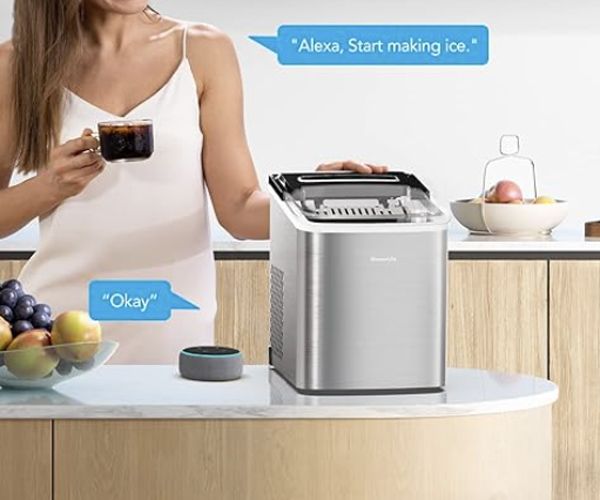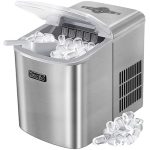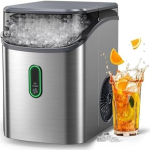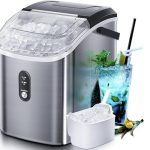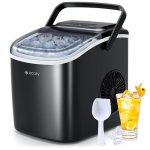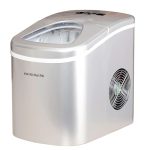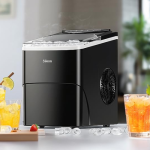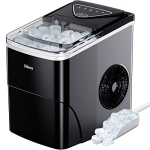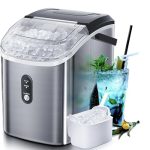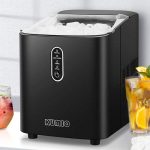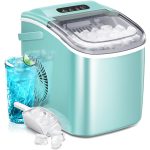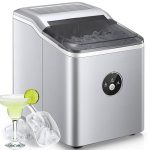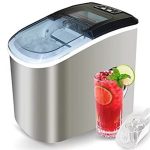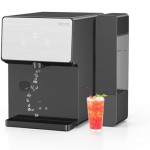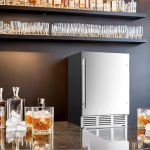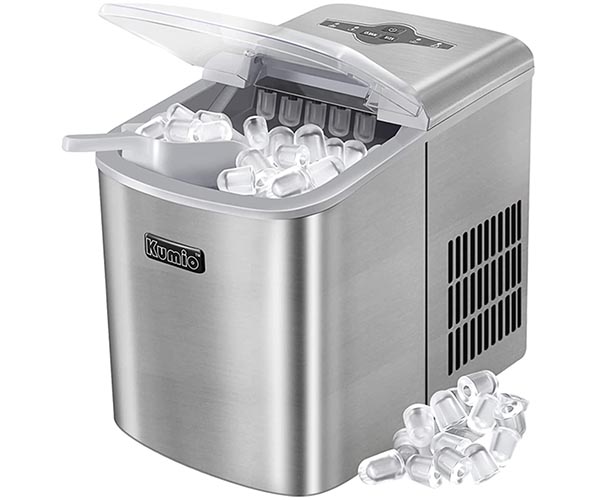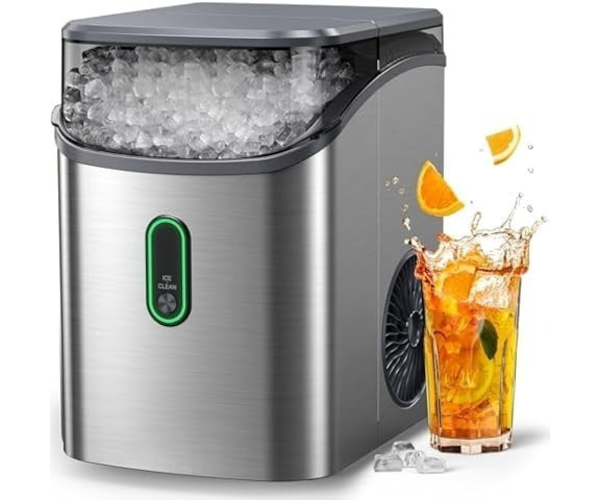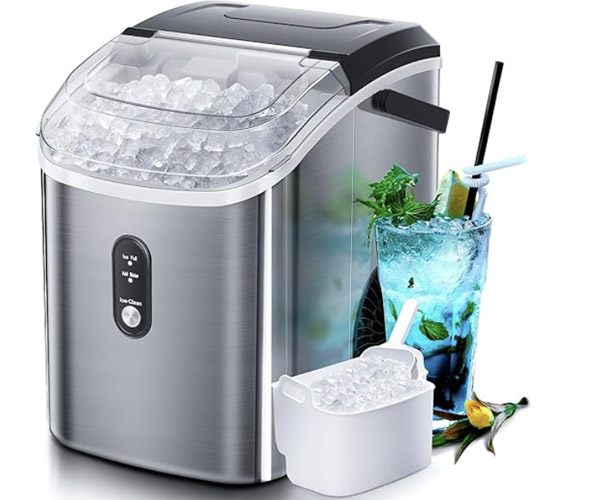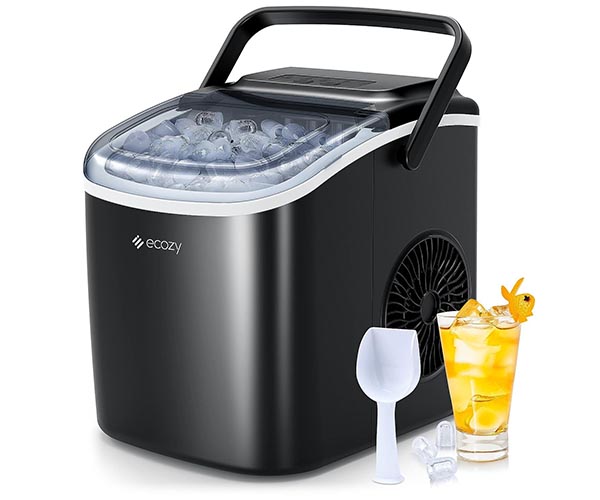Introduction
The demand for countertop ice makers in commercial settings has seen a significant rise in recent years. Businesses such as restaurants, bars, cafes, and offices increasingly rely on these compact yet powerful machines to meet their ice needs efficiently. The appeal of countertop ice makers lies in their ability to produce a substantial amount of ice quickly, without occupying the large footprint or requiring the extensive plumbing of traditional ice machines.
Increasing Demand in Commercial Settings
- Restaurants and Bars: These establishments require a steady supply of ice for drinks, food preparation, and presentation. Countertop ice makers provide a convenient solution that can be easily integrated into the workspace.
- Offices and Break Rooms: For employee comfort and convenience, offices often include ice makers to ensure that fresh, cold beverages are always available.
- Cafes and Fast Food Outlets: Quick service demands quick ice production, and countertop ice makers fit perfectly into this high-demand environment. https://amzn.to/3WoePQf
Focus on Catering to Commercial Needs
- Operational Efficiency: Commercial countertop ice makers are designed to handle high usage volumes, producing ice rapidly and consistently. This operational efficiency ensures that businesses can meet peak demands without delay.
- Space-Saving Design: These ice makers are compact enough to fit on countertops or under counters, making them ideal for businesses with limited space. Their design maximizes efficiency without sacrificing valuable workspace.
- Ease of Use and Maintenance: Commercial models are user-friendly, with intuitive controls and easy maintenance routines. This ensures minimal downtime and keeps the ice supply uninterrupted.
As we delve into the specifics of how countertop ice makers cater to commercial needs, it becomes clear that their design and functionality are tailored to provide both convenience and efficiency. These appliances not only enhance the operational workflow in busy environments but also offer a cost-effective solution for maintaining a constant supply of ice.
Understanding Commercial Countertop Ice Makers
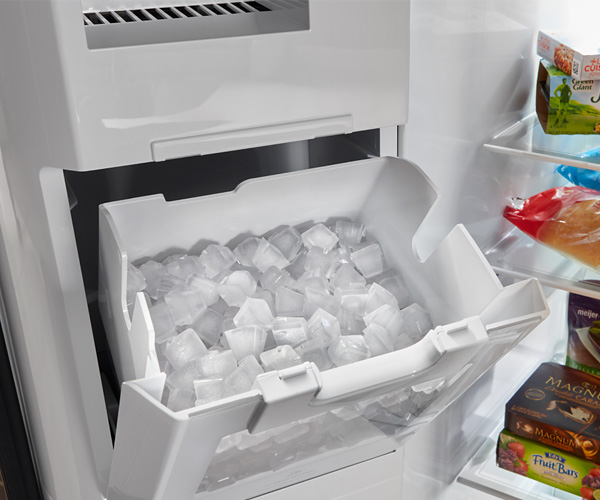
Commercial countertop ice makers are engineered to meet the demanding needs of business environments, where a reliable and rapid supply of ice is essential. Understanding how these machines consume energy and their production capabilities can help businesses optimize their use and select the most suitable models for their needs.
Energy Usage Basics
- Operational Mechanics: Similar to residential models, commercial countertop ice makers operate using a compressor that circulates refrigerant to cool water into ice. However, commercial units are typically more robust and powerful, requiring more energy to support higher production rates and continuous operation.
- Power Consumption: The energy usage of commercial ice makers can vary widely depending on their capacity and technology. On average, these machines consume between 300 to 600 watts per hour. Energy efficiency can be enhanced by selecting models with advanced features such as eco-friendly refrigerants and energy-saving modes.
Capacity and Speed
- Larger Capacity: Commercial countertop ice makers are designed to produce a significantly larger volume of ice compared to residential models. They typically produce between 50 to 150 pounds of ice per day, catering to high-demand environments such as busy restaurants or bars.
- Faster Production Speed: The speed at which these machines produce ice is crucial for commercial use. Many commercial ice makers can produce a batch of ice in as little as 10 minutes, ensuring that there is always a ready supply to meet customer needs. This rapid production helps businesses maintain efficiency during peak times.
By understanding the energy consumption and production capabilities of commercial countertop ice makers, businesses can make informed decisions that balance operational needs with energy efficiency. Choosing the right model ensures that they can meet their ice demands without incurring excessive energy costs, thereby optimizing both performance and cost-effectiveness.
Key Features of Commercial Countertop Ice Makers
Commercial countertop ice makers are equipped with several key features that distinguish them from their residential counterparts. These features are specifically designed to ensure durability, efficiency, and performance in demanding commercial environments.
Durability and Design
- Robust Build: Commercial ice makers are constructed with high-quality materials such as stainless steel, which offers durability and resistance to wear and tear. This robust build ensures that the machines can withstand the rigors of a busy commercial setting, including frequent use and exposure to various environmental factors.
- Ergonomic Design: These machines are designed to be compact yet highly functional, fitting easily into limited spaces such as countertops or under counters. Their design also incorporates user-friendly elements like easy-access bins and intuitive controls, making them convenient to operate and maintain in fast-paced environments.
Advanced Technology
- Efficient Compressors: Modern commercial ice makers feature advanced compressors that are both powerful and energy-efficient. These compressors are capable of rapid ice production while minimizing energy consumption, which is crucial for maintaining operational costs.
- Smart Controls: Many commercial ice makers come with digital controls and smart technology that allow for precise adjustments and monitoring. Features like programmable timers, automatic shut-off, and real-time diagnostics help operators manage the ice production process more effectively.
- Enhanced Cooling Systems: Advanced cooling systems, including eco-friendly refrigerants and optimized airflow designs, enhance the efficiency and sustainability of these machines. These systems ensure consistent ice production even under high demand, while also reducing the environmental impact.
- Self-Cleaning Functions: To maintain hygiene and operational efficiency, many commercial ice makers include self-cleaning features. These functions automate the cleaning process, reducing the need for manual intervention and ensuring that the ice produced is always clean and safe for consumption. https://amzn.to/3WoePQf
The combination of durability, smart design, and advanced technology makes commercial countertop ice makers a valuable asset in any business setting. These features not only improve the performance and longevity of the machines but also contribute to a smoother, more efficient operation, helping businesses meet their ice needs reliably and sustainably.
Installation and Setup
Installing and setting up a commercial countertop ice maker involves understanding its space, power, and plumbing requirements to ensure optimal performance. Proper installation not only maximizes efficiency but also extends the lifespan of the appliance.
Space and Power Requirements
- Compact Footprint: Commercial countertop ice makers are designed to fit into smaller spaces, such as countertops or under-counter areas. However, it’s crucial to ensure that there is adequate ventilation around the unit to prevent overheating and to allow for efficient operation.
- Power Supply: These ice makers typically require a standard 110-120V electrical outlet, although some larger models might need a higher voltage. It’s important to check the specific power requirements of your model to avoid electrical issues. Additionally, ensure that the outlet can handle the power load to prevent tripping breakers or other electrical problems.
Plumbing and Maintenance
- Water Supply Connection: Most commercial countertop ice makers need a direct water line connection to ensure a continuous supply of water. This involves attaching a hose from the machine to a nearby water source. The water supply should be reliable and clean to prevent contamination and ensure consistent ice quality.
- Drainage System: A proper drainage system is necessary to handle the melted ice and excess water from the machine. This typically involves a drain hose connected to a sink or a dedicated drain line. Proper drainage prevents water overflow and potential damage to the machine or surrounding area.
- Regular Maintenance: Regular maintenance is essential to keep the ice maker functioning efficiently. This includes routine cleaning of the ice bin and internal components, descaling to remove mineral deposits, and checking for any signs of wear or damage. Most models come with a user manual detailing specific maintenance procedures and schedules.
- Filter Replacement: If the ice maker includes a water filtration system, the filter should be replaced according to the manufacturer’s recommendations, usually every six months. This ensures that the water used for ice making is free from impurities, which not only improves ice quality but also protects the machine from scale buildup.
By following these installation and setup guidelines, businesses can ensure that their commercial countertop ice makers operate efficiently and reliably. Proper setup and regular maintenance are key to maximizing the performance and longevity of these appliances, ensuring a steady supply of high-quality ice to meet commercial demands.
Benefits of Using Countertop Ice Makers in Commercial Settings
Commercial settings such as restaurants, bars, and offices demand efficient and reliable ice production to meet their operational needs. Countertop ice makers offer numerous advantages that make them an attractive option for these environments, particularly in terms of convenience, accessibility, and cost-effectiveness.
Convenience and Accessibility
- Streamlined Operations: Countertop ice makers simplify daily operations by providing a steady supply of ice directly at the point of use. In restaurants and bars, having ice readily available on the countertop means faster service and less time spent retrieving ice from a central location.
- User-Friendly Design: These machines are designed to be intuitive and easy to use, requiring minimal training for staff. Features such as digital controls, automatic shut-off, and clear ice bins make it simple for employees to operate and monitor the ice maker.
- Space-Saving: The compact design of countertop ice makers allows them to fit into small spaces, freeing up valuable floor space for other equipment or activities. This is particularly beneficial in busy kitchens or bar areas where space is at a premium.
- Mobility: Many countertop models are portable, allowing them to be moved as needed to different areas within the establishment. This flexibility ensures that ice is always accessible wherever it is most needed.
Cost-Effectiveness
- Lower Initial Investment: Compared to traditional built-in ice machines, countertop ice makers typically have a lower initial cost. This makes them a more affordable option for small businesses or startups looking to minimize their capital expenditures.
- Reduced Installation Costs: The installation of countertop ice makers is straightforward and does not require extensive plumbing or electrical work, further reducing setup costs. This simplicity can translate to significant savings compared to the complex installation requirements of larger, built-in units.
- Energy Efficiency: Many modern countertop ice makers are designed with energy-saving features that reduce electricity consumption. This not only lowers utility bills but also supports environmental sustainability.
- Maintenance Savings: With self-cleaning features and easy access for manual cleaning, countertop ice makers are easier and less expensive to maintain. Regular maintenance helps prevent costly repairs and extends the lifespan of the machine.
By integrating countertop ice makers into their operations, businesses can enjoy the dual benefits of enhanced convenience and significant cost savings. These machines are an excellent investment for any commercial setting, providing a reliable and efficient solution for ice production that supports smooth, uninterrupted service. https://amzn.to/3WoePQf
Maintenance and Troubleshooting
Regular maintenance and prompt troubleshooting are crucial to ensuring that commercial countertop ice makers operate efficiently and have a long lifespan. By adhering to routine maintenance tips and understanding common issues, businesses can keep their ice makers in optimal condition, minimizing downtime and repair costs.
Routine Maintenance Tips
- Regular Cleaning: Clean the ice bin, water reservoir, and internal components regularly. Use a mixture of warm water and mild detergent, or follow the manufacturer’s recommendations for cleaning solutions. Regular cleaning prevents mold, bacteria, and mineral buildup.
- Descaling: Depending on the hardness of your water, scale can build up inside the ice maker, affecting performance. Descale the machine every 3-6 months using a commercial descaling solution to ensure efficient operation and extend the machine’s lifespan.
- Check Water Filters: If your ice maker has a water filtration system, replace the filters as recommended by the manufacturer, usually every six months. Clean filters ensure the ice is free from impurities and prevent mineral deposits from forming.
- Inspect Seals and Hoses: Regularly inspect the seals and hoses for any signs of wear or leaks. Replacing worn parts promptly can prevent larger issues and maintain the efficiency of the ice maker.
- Ventilation: Ensure that the ice maker has adequate ventilation. Keep the vents free of dust and debris to prevent overheating and maintain efficient cooling.
Common Issues and Solutions
- Ice Maker Not Producing Ice: If the ice maker stops producing ice, check the water supply first. Ensure that the water line is connected and the water valve is open. Also, check the filters for clogs and replace them if necessary.
- Poor Ice Quality: If the ice is cloudy or soft, it could be due to poor water quality or improper temperature settings. Use filtered water and ensure the machine is in a cool, well-ventilated area. Adjust the thermostat settings as needed.
- Unusual Noises: Loud or unusual noises may indicate a problem with the compressor or a mechanical issue. Check for loose parts and ensure that the machine is level. If the noise persists, it may be necessary to consult a professional technician.
- Water Leaks: Water leaks can result from loose or damaged hoses, or a problem with the water inlet valve. Inspect all connections and hoses, and replace any that are worn or damaged. Ensure that the ice maker is level to prevent overflow from the ice bin.
- Ice Maker Freezing Up: If the ice maker is freezing up, it could be due to a malfunctioning thermostat or issues with the water supply. Check the thermostat settings and ensure that the water flow is steady. If the problem continues, a technician may need to inspect the internal components.
By following these maintenance tips and addressing common issues promptly, businesses can ensure their commercial countertop ice makers remain reliable and efficient. Regular upkeep not only enhances performance but also helps avoid costly repairs, ensuring a consistent supply of high-quality ice to meet commercial demands.
RFQs about How do countertop ice makers work for commercial use?
1.How do commercial countertop ice makers work?
- Commercial countertop ice makers work by pumping water into a freezing tray, where a refrigeration system cools it to form ice. The ice is then ejected into a storage bin, ready for use. These machines are designed to produce large quantities of ice quickly, catering to the high demands of commercial settings like restaurants and bars.
2.What are the benefits of using a commercial countertop ice maker?
- The main benefits include convenience, as they provide a steady supply of ice directly at the point of use, and space-saving design, which fits well in smaller commercial environments. They also offer energy efficiency, cost savings on installation and maintenance, and ease of use with features like digital controls and self-cleaning functions.
3.How much ice can a commercial countertop ice maker produce?
- Production capacity varies by model, but most commercial countertop ice makers can produce between 50 to 150 pounds of ice per day. This high output is sufficient to meet the needs of busy commercial environments, ensuring that there is always a ready supply of ice for drinks, food preparation, and other uses.
4.What are the maintenance requirements for commercial countertop ice makers?
- Regular maintenance includes cleaning the ice bin and internal components, descaling to remove mineral deposits, checking and replacing water filters, inspecting seals and hoses for wear, and ensuring proper ventilation. Regular maintenance helps maintain efficiency and extend the lifespan of the ice maker.
5.How can I troubleshoot common issues with my commercial ice maker?
- For issues like not producing ice, check the water supply and filters. Poor ice quality can be improved by using filtered water and adjusting temperature settings. Unusual noises may indicate mechanical problems, while water leaks often stem from loose or damaged hoses. Regular inspections and prompt repairs can prevent these issues.
6.Are commercial countertop ice makers energy efficient?
- Many modern commercial countertop ice makers are designed to be energy efficient, featuring advanced compressors, eco-friendly refrigerants, and energy-saving modes. Look for Energy Star-certified models, which meet strict energy efficiency guidelines and can reduce operational costs while being environmentally friendly.
Conclusion
In conclusion, the advantages of using countertop ice makers in commercial settings are numerous and compelling. These appliances offer unmatched convenience by providing a steady supply of ice directly at the point of use, thereby streamlining operations in busy environments such as restaurants, bars, cafes, and offices. Their compact design saves valuable space, making them ideal for locations where every inch counts. Moreover, their ease of use and minimal maintenance requirements make them a practical choice for businesses looking to enhance efficiency without adding to the workload.
- Convenience and Accessibility: Countertop ice makers simplify the process of ice production and storage, ensuring that high-quality ice is always available when needed. Their user-friendly design and intuitive controls make them easy to operate, even for staff with minimal training.
- Cost-Effectiveness: Compared to traditional ice-making solutions, countertop models often come with a lower initial investment and reduced installation costs. Their energy-efficient operation and advanced features, such as self-cleaning functions, further contribute to long-term savings.
- Enhanced Performance: With their robust build and advanced technology, commercial countertop ice makers deliver consistent performance, capable of meeting the high demands of commercial settings. Their rapid ice production and large capacity ensure that there is always enough ice to keep up with customer needs.
Considering these benefits, it is clear that commercial countertop ice makers are a valuable investment for any business that requires a reliable and efficient ice supply. By choosing a model that suits your specific needs, you can enhance the overall functionality of your operation, improve service delivery, and achieve significant cost savings. I encourage you to explore the various models available and consider how these versatile appliances can enhance your business operations, providing convenience, efficiency, and reliability.

Call to Action
As you evaluate your current ice production setup, consider the numerous benefits that a commercial countertop ice maker can bring to your business. These compact, efficient machines are designed to meet the rigorous demands of commercial environments, providing a reliable and steady supply of ice with minimal maintenance. Now is the perfect time to upgrade your equipment and enhance the efficiency of your operations.
- Assess Your Commercial Ice Needs: Take a close look at your current ice usage and production capacity. Identify any gaps or inefficiencies in your current setup. Determine whether a countertop ice maker can meet your specific needs, such as higher production volumes, faster ice making, or improved energy efficiency.
- Explore Your Options: Visit local appliance stores or browse online platforms to see the latest models of commercial countertop ice makers. Many retailers offer demonstrations, which can provide valuable insights into the functionality and benefits of different models. Online reviews and product comparisons can also help you make an informed decision.
- Invest in Quality and Efficiency: Prioritize energy-efficient models with advanced features like self-cleaning functions and digital controls. Investing in a high-quality ice maker not only ensures a steady supply of ice but also reduces long-term operational costs and maintenance efforts.
By upgrading to a commercial countertop ice maker, you can streamline your ice production process, improve service delivery, and enhance overall operational efficiency. Don’t miss the opportunity to enhance your business with the convenience and reliability of a modern ice maker. Start exploring your options today and make a smart investment that will benefit your business for years to come. https://amzn.to/3WoePQf
References
- GE Profile Opal Nugget Ice Maker Product Page
- NewAir Countertop Ice Maker Product Page
- Igloo ICEB26HNBK Portable Electric Countertop Ice Maker Product Page
- Scotsman SCN60PA-1SS
- EUHOMY Nugget Ice Maker Countertop
- Silonn Ice Maker Countertop
Additional Resources
- [How often should you clean your countertop ice maker?]
- [What happens if you don’t clean your countertop ice maker regularly?]
- [How does a countertop ice maker work?]
- [How to install a countertop ice maker?]
- [How often to descale a countertop ice maker?]
- [Buying Guide: Countertop Ice Makers with Water Line Connection]
- [Kitchen Upgrade Ideas: Countertop Ice Makers with Water Line]
- [Which countertop ice maker with freezer is best?]

